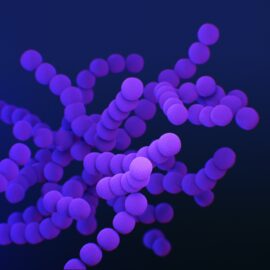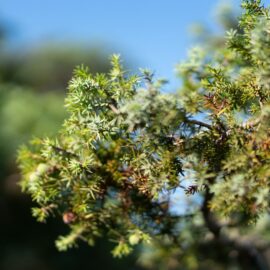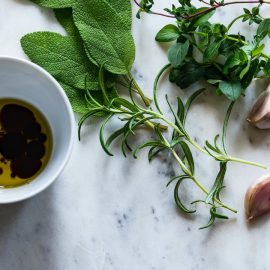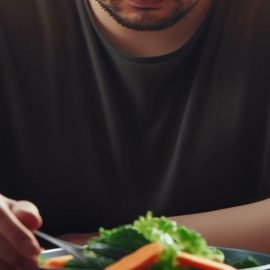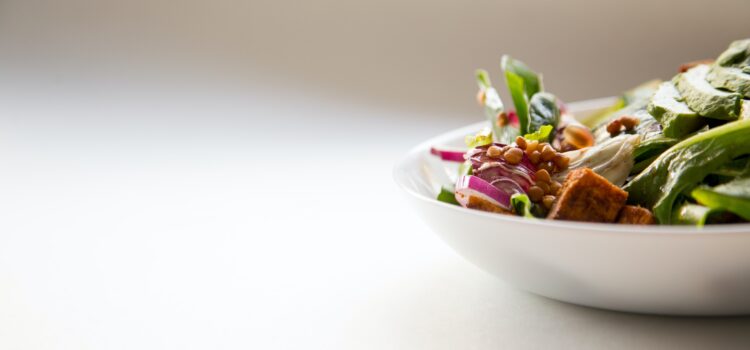
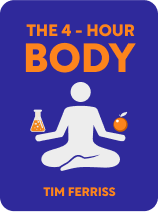
This article is an excerpt from the Shortform book guide to "The 4-Hour Body" by Timothy Ferriss. Shortform has the world's best summaries and analyses of books you should be reading.
Like this article? Sign up for a free trial here .
What is the relationship between a plant-based diet and weight loss? What does The 4-Hour Body say about the health benefits of a plant-based diet?
A plant-based diet and weight loss can go hand-in-hand if you do it right. Eating a plant-based diet for weight loss is the second phase of the diet in The 4-Hour Body.
Read more about The 4-Hour Body, the health benefits of a plant-based diet, and weight loss.
Plant-Based Diet and WEight Loss
After following the Slow-Carb Diet for 3-4 months, the author recommends two weeks on a primarily plant-based diet (PPBD), a diet in which at least 70% of the volume of food comes from plants. This is for three reasons:
- You’ll gain knowledge. The constraints of the PPBD diet will force you to learn more about what food is made up of and where it comes from.
- For example, you’ll learn new sources of vitamins and minerals that you’ll consume even after you’ve gone back to the Slow-Carb Diet.
- You’ll help the environment. In general, eating plants (if they’re locally sourced and not monocrops) is better for the environment than eating meat because it takes more resources (land, water, and so on) to produce meat than plants. Note that you’ll have a better long-term effect on the environment if you eat more plants regularly, rather than go vegan for short periods occasionally.
- You’ll eat better quality food. Your diet will consist of unprocessed, local, and natural foods, all of which are good for you. That can be one of the big health benefits of a plant-based diet.
(Shortform note: Read our summary of The China Study for more on the benefits of a plant-based diet.)
Five Steps to Moving to a Primarily Plant-Based Diet (PPBD)
When moving to a primarily plant-based diet (PPBD), it’s best to transition slowly to avoid the following problems:
- Not eating enough calories. If you stop eating meat, you need to replace it with something or else you’ll feel hungry or eat vegetarian junk food, such as imitation meat.
- Giving up on the diet because it’s too hard.
There are five steps to achieving a 100% PPBD, but you can stop at an earlier step if you think the later steps are unsustainable for you. Eating a plant-based diet for weight loss won’t work if you’re consuming the wrong things.
- Replace starches, such as bread and grains, with legumes, such as beans. This is already part of the Slow-Carb Diet so should be familiar.
- Make sure your meat comes from local sources (within 50 miles of where you live). Likewise, ensure it’s grass-fed and/or pasture-raised.
- Eat less meat by only eating meat on certain days of the week (such as cheat day) or only after 6 pm.
- Stop eating meat except for fish. Continue to eat dairy and eggs.
- Move to eating only plant-based foods.
Troubleshooting a Plant-Based Diet and Weight Loss
There are several common questions and problems associated with moving to a primarily plant-based diet:
Problem #1: You don’t know where to get your protein. Eat whole foods that contain a lot of protein, such as nuts, or plant-based protein powder, such as rice or pea protein. Avoid soy, because while it’s a source of protein, it can cause thyroid problems, and it contains estrogen, which in large amounts can cause sterility. Also, avoid dairy—in large quantities, it can cause health problems because store-bought products often contain antibiotics and hormones, which are bad for you.
Problem #2: You’re not getting enough nutrients. If you’re eating a PPBD, you won’t get the same nutrients as if you were eating animal products. In particular, make sure you get the USRDA recommended doses of vitamins D, B-12, and K, and biotin, lysine, and iodine by either using supplements or carefully planning what you eat. Otherwise, this can undermine eating a plant-based diet for weight loss. If you’re planning to get all your nutrients from food, consider consulting a nutritionist.
Problem #3: You like eating out, or you’re traveling and have less control over what you eat. Just like the Slow-Carb Diet, eat Mexican and Thai cuisine because both include veggies and beans. You can also eat raw nuts, which are available in most airports and will keep you full for a long time.
John Berardi’s Tips for Successfully Eating a 100% PPBD
John Berardi is a scientist who studies nutrient biochemistry and exercise. He advises high-level athletes on their nutrition and decided to do a 28-day experiment during which he ate vegan and tried to gain muscle mass. He was successful—he gained around 5 pounds of muscle and 2 pounds of fat.
Berardi has some tips on going vegan from his experiment and his scientific background:
- Monitor your digestion. Plants contain fiber and lectins, which are hard to digest. When you eat too much fiber, it upsets your stomach and inhibits your body from digesting other food and absorbing nutrients. Lectins can lead to bloating, diarrhea, and flatulence.
- Don’t worry about increasing your food budget. While you’ll probably have to start buying supplements, you’ll be spending less on food because plants are less expensive than meat.
- Do all your food prep in a batch—preparing vegetables and legumes can be time-consuming and labor-intensive, and a lack of enthusiasm for chopping vegetables could make you miss meals. As soon as he gets home from the grocery store, Berardi makes granola, pre-chops his vegetables, and soaks and then cooks his beans. That way, when it’s time to eat, the work’s already done.
- Eat all nine essential amino acids every meal to build muscle. Do this by combining foods—for example, beans are low in methionine, so combine them with other food that’s high in methionine. If you eat only some of the amino acids, when they reach your bloodstream, there will be an imbalance, so your body will pull the missing parts from your muscles, which makes them weaker.
Don’t Eat a 100% PPBD Forever
The author doesn’t permanently eat a 100% PPBD for two reasons:
Reason #1: Evolutionary biology and anthropology suggest humans should eat meat:
- No healthy indigenous cultures ate a 100% vegan diet.
- Chimpanzees, our closest relatives, eat meat.
- The human body produces elastase, an enzyme that breaks down connective tissue.
Reason #2: Empirical evidence suggests health problems arise from not eating animal products:
- While researching the book, the author met many vegan women who experienced miscarriages. After changing their diets to include meat, they were able to have healthy pregnancies.
- Male children with hypospadias (misplaced urethra) are 500% more likely to have vegetarian mothers than mothers who eat meat.
The author doesn’t know exactly why avoiding animal products causes health problems, but he thinks it’s either because vegetarian staples, like soy, are responsible, or because animal products are critical to hormone production.

———End of Preview———
Like what you just read? Read the rest of the world's best book summary and analysis of Timothy Ferriss's "The 4-Hour Body" at Shortform .
Here's what you'll find in our full The 4-Hour Body summary :
- How to do the least amount you need to do for the results you want
- Why you need a cheat day in your diet
- How to improve everything about your body, including sleep, sex, and longevity

